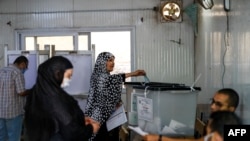Egypt is holding the first round of elections for its lower chamber of parliament Saturday in 14 of the country's 27 provinces. The second round is due to be held in the rest of the country early next month, with final results expected in December.
Voters turned out Saturday to cast their ballots in 14 of Egypt's 27 provinces, including the historic port city of Alexandria and Cairo's sister province of Giza. Voter turnout was mixed, with Egyptian media reporting lines at some polling stations and a light turnout at others.
Egyptian media broadcast video of public figures, including Prime Minister Mustafa Madbouly casting ballots at polling stations near their homes. Police and military were posted outside to prevent possible acts of terrorism and voters were given masks to prevent the spread of COVID-19.
Sixty-three million Egyptians are eligible to vote in both rounds of the election and officials reminded voters that they could face an equivalent of a $30 fine if they do not cast their ballots. In practice, however, fines are rarely imposed on those who do not vote.
Said Sadek, who teaches political sociology in Cairo, says the Egyptian public appears to be looking for stability, amid regional turbulence, and after the tumult of two revolutions which shook the country in 2011 and 2013.
"The people want regular, slow, stable reform, rather than unplanned, directionless revolution and revolt. And, of course, you will find that regional enemies are promoting instability and calling for revolts and sabotage and overthrow [of] the government," he said.
Sadek added that "Egyptians have tried this road before and ended up in a miserable situation." He argues that most Egyptians "don't want to go back to the time of the revolution of 2011."
Paul Sullivan, a professor at the U.S. National Defense University, says "it is important that people have a voice." He said that his "long experience with Egyptians from (various) economic, social, political and cultural backgrounds is that they are proud of their country and have a lot to say about where it is and where it should be going."
Four thousand candidates are running for 50% of the eligible seats in the 568-seat chamber, while slightly over 1,100 candidates are vying for the other half of the chamber which is being elected by party list. Egyptian President Abdel Fattah el-Sissi will also appoint members to an extra 28 seats.
A number of foreign and Egyptian NGOs are acting as election monitors.
The now-outlawed Muslim Brotherhood, which was toppled by a popular revolution supported by the military in 2013, is not allowed to run any candidates, but continues to have an active media arm in both Qatar and Turkey, opposing the government.




